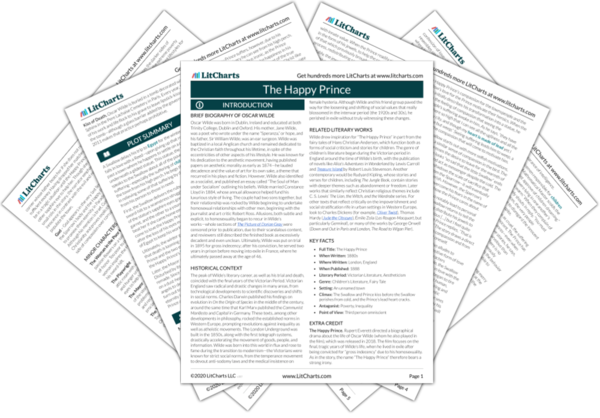Wilde frequently uses children and youth as a symbol of innocence and goodness in “The Happy Prince.” The Prince only intercedes on behalf of children or young people—he chooses the seamstress due to her need to care for her sick son and emphasizes the youth of both the playwright and the little match-girl. On various occasions, children make poignant observations about their suffering only to be rebuffed by an adult (who technically should be responsible for their welfare). As the father beats the match-girl, so does the mathematical master resent the charity children he should teach. At one point, two children sleeping under a bridge in winter exclaim “how hungry we are!” only to have a watchman shouts back at them, “you should not lie here!”
Wilde invokes children as a symbol of innocence in order to emphasize the corrupting force of society—evil is not born, but taught. Furthermore, as these children are innocent they cannot deserve any of the suffering or misery they are forced to undergo—that children are forced to suffer exposes the toxicity at the root of civilization. This type of invocation of children to expose corruption has a long history in literature—a resonant example would be the speech by Ivan Karamazov in The Brothers Karamazov by Fyodor Dostoevsky, where his horror at the suffering of children shakes the foundation of his faith in God. For Wilde, children make the ultimate symbol for suffering, as their freshness and youth preclude any possibility of guilt.
Children Quotes in The Happy Prince
He passed over the river, and saw the lanterns hanging to the masts of the ships. He passed over the Ghetto, and saw the old Jews bargaining with each other, and weighing out money in copper scales. At last he came to the poor house and looked in. The boy was tossing feverishly on his bed, and the mother had fallen asleep, she was so tired. In he hopped, and laid the great ruby on the table beside the woman's thimble. Then he flew gently round the bed, fanning the boy's forehead with his wings. 'How cool I feel," said the boy, "l must be getting better"; and he sank into a delicious slumber.

Unlock explanations and citation info for this and every other The Happy Prince quote.
Plus so much more...
Get LitCharts A+"ln the square below," said the Happy Prince, "there stands a little matchgirl. She has let her matches fall in the gutter, and they are all spoiled. Her father will beat her if she does not bring home some money, and she is crying. She has no shoes or stockings, and her little head is bare. Pluck out my other eye, and give it to her, and her father will not beat her." "l will stay with you one night longer," said the Swallow, "but I cannot pluck out your eye. You would be quite blind then." "Swallow, Swallow, little Swallow," said the Prince, "do as I command you," So he plucked out the Prince's other eye, and darted down with it. He swooped past the match-girl, and slipped the jewel into the palm of her hand. "What a lovely bit of glass," cried the little girl; and she ran home, laughing. Then the Swallow came back to the Prince. "You are blind now," he said 'so I will stay with you always."
"Dear little Swallow," said the Prince, “you tell me of marvellous things, but more marvellous than anything is the suffering of men and of women. There is no Mystery so great as Misery. Fly over my city, little Swallow, and tell me what you see there." So the Swallow flew over the great city, and saw the rich making merry in their beautiful houses, while the beggars were sitting at the gates. He flew into dark lanes, and saw the white faces of starving children looking out listlessly at the black streets. Under the archway of a bridge two little boys were lying in one another's arms to try and keep themselves warm. "How hungry we are!" they said. “You must not lie here," shouted the Watchman, and they wandered out into the rain.












